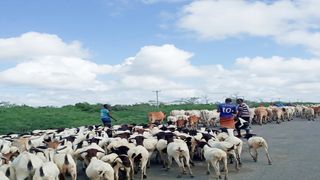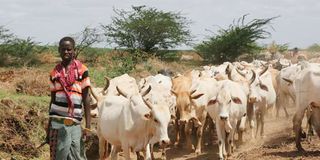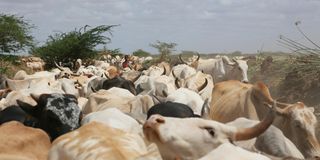
Ibrahim Bare,16, and colleagues lead 780 heads of cattle and sheep across the Tana Delta towards the grazing field in Mbililo in Garsen East.
| Stephen Oduor I Nation Media GroupCounties
Premium
Inside the pastoralist sojourn: A story of endurance for the love of cattle
For decades, pastoralists have been covering thousands of kilometres in search of pasture and water for their livestock every dry season.
From enduring the scorching sun, surviving wild animal attacks, burying loved ones lost to snake bites, and the biting cold of the night, the herdsmen have encountered battles that only very few of their kind can dare challenge.
The adventure of eating wild honey with milk along the great trek and enjoying wild game meat is just a slight consolation to the misery the pastoralists go through in their journey.
Ibrahim Khalake left home in October 2019, following a severe drought that hit Lagdera, Garissa County.
With his bosses’ 200 heads of cattle and his three children, they embarked on a journey towards Tana Delta in search of pasture and water.
“We passed many villages and met some of the herdsmen headed the same direction, together we formed one big group and continued with the trek,” he narrates.
This was the fourth time he was making the trip to the wilderness, covering about 3,000km in three years. The first time he made the trip, he was 14 years old, joining the hustle like his mates to earn a living and buy property.

Ibrahim Bare,16, and colleagues lead 780 heads of cattle and sheep across the Tana Delta towards the grazing field in Mbililo in Garsen East.
“My salary was one goat every month I was away in the wilderness. It was upon me to choose which goat I wanted, the young ones were better,” he says.
Lost his son
The hustle, however, has not been kind to the herdsman, who has since lost a son and a nephew in the wilderness.
His son had excused himself to answer the call of nature in a thicket in the middle of a reserve in Tana River when he came head to head with a buffalo, which knocked him out and trampled him to death.
"I just heard a sharp wail about ten metres behind me followed by a cloud of dust. By the time the dust settled I saw my son lying lifeless on the ground and a herd of buffaloes walking away," he narrates.
He was sure there was no life in the boy and hence could not do much. Together with his friends they dug a grave in the wilderness, held a prayer and buried him, then soldiered on.
His heart was torn. The boy was the firstborn in the family and had just set out for the first time to make a living.
"I thought of going back home, but remembered how dry it was and what would happen to my animals. I counted my losses as the journey had to continue," he says.
Another tragedy
In January 2019, a similar tragedy struck. This time the victim was his 13-year-old nephew. In the dead of night, while asleep in a makeshift tent, he was bitten by a poisonous snake.
They tried to contain the poison with traditional herbs, but the boy died on his father's back.
"It was a painful experience for us, having lost a child eight months earlier. It was unbearable but that was the life we had chosen," he says.
The trek has remained one of their greatest life lessons, with various horrifying encounters.
Herdsmen, Khalake said, are sometimes forced to tap a cow's urine to drink for survival when they run out of water and are far from any source.
He notes that while some die from attacks by wild animals, some die of sicknesses like pneumonia as a result of the cold nights.
"When one dies and leaves behind his herd, we must ensure that the herd is driven back to the owner after they are well fed. We don't steal, the owner of the cattle will pay the messenger as per the agreement," says Issack Dido, a herdsman from Kitui.
Conflicts
However, the herdsmen also have to fight for space to graze their cattle once they get to areas with pasture.
Arguments over pasture often culminate in physical fights that result in death or injuries, especially in areas with farmers as the majority population and pastoralists of a different clan.
For instance, in Kitui County their kind is not welcomed, and any sight of them triggers an alert that is always treated as a security breach by the local police.
Their presence in the Tana Delta area is always treated as a warning by security teams on the ground.
The GSU and the Kenya Defense Forces often ambush their camps at night and force them to continue their journey at night.
"Sometimes they just get wild with the livestock, they come at dawn, beat the animals with their whips, injuring and scattering them. In such circumstances we have to move on," he notes.

Ibrahim Bare,16, and colleagues lead 780 heads of cattle and sheep across the Tana Delta towards the grazing field in Mbililo in Garsen East.
Tana River County Police Commander Emmanuel Mwaringa notes that the arrival of the herdsmen often triggers chaos resulting in bloodshed and hence the need for caution.
"It is not a witch-hunt or a desire to just beat people. Some of the herdsmen cannot differentiate a grazing field from a maize farm, it is all one to them and hence are very defiant," he says.
Nevertheless, he notes that security personnel are always advised to guide and protect the herdsmen as they enter the delta, as well as provide them with safe passage through hostile communities towards the Boni forest.
He added that some of the herdsmen have been found to smuggle illegal items to local communities
As they flee from the harsh security forces, they meet the unfriendly faces of the farming communities armed with machetes to safeguard their farms from invasion.
"The farming communities, especially at the heart of Tana Delta, are very intolerant if your cow plucks just a leaf of maize from the farm. They cut twenty cows with their machetes. We are always in a hurry to pass those places," Dido notes.
The sight of grass in Mbililo's open field gives them relief, but their survival in the wilderness is a tale of cyclical pain and struggles.
When it rains back home, they leave the wilderness with their livestock to reunite with their families, but when drought strikes again, they are back to the cycle that takes them away from home for another year.





